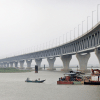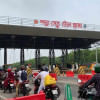Govt rehabilitates the displaced
We are encouraged by the government's move to rehabilitate people displaced by land acquisition for the construction of the Padma Bridge. The government's plan to train those who have lost their jobs, as a result of the land acquisition, to help them find alternative means of livelihood, is reassuring.
According to the project director of the Padma Bridge project, 97 percent of acquisition has been completed and 70 percent of the displaced people, numbering around 3,000 reportedly, have been rehabilitated thus far. The Padma Bridge project has already started showing signs of an economic impact. Housing rent and land prices have shot up in the area, paving the way for increased income for locals; people from other parts of the country, hoping to find work, are relocating near the site of the construction.
However, while many have been able to switch to new jobs successfully, those who were fully reliant on farming, remain jobless. Some farmers have said that they have not been awarded proportionately by the government, i.e. they have lost more land than they have been compensated with. It has also been alleged that Chinese companies involved in the project hired workers from other parts of the country, depriving locals of job opportunities.
In this regard, the government must address the plight of the farmers who, because of their limited occupational labour mobility, need specialised training to acquire other skills. The issue of limited funds needs to be solved immediately and the rehabilitation scheme adjusted accordingly. Authorities must also allay the concerns of displaced locals who are unfairly being left out of the construction project.

 For all latest news, follow The Daily Star's Google News channel.
For all latest news, follow The Daily Star's Google News channel. 








Comments